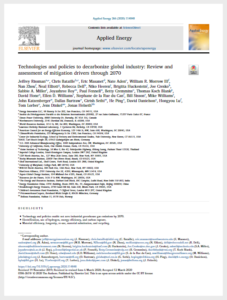Full Title: Technologies and Policies to Decarbonize Global Industry: Review and Assessment of Mitigation Drivers through 2070
Author(s): Jeffrey Rissman, Chris Bataille, Eric Masanet, et al.
Publisher(s): Applied Energy
Publication Date: April 3, 2020
Full Text: Download Resource
Description (excerpt):
Fully decarbonizing global industry is essential to achieving climate stabilization, and reaching net zero greenhouse gas emissions by 2050–2070 is necessary to limit global warming to 2 °C. This paper assembles and evaluates technical and policy interventions, both on the supply side and on the demand side. It identifies measures that, employed together, can achieve net zero industrial emissions in the required timeframe. Key supply-side technologies include energy efficiency (especially at the system level), carbon capture, electrification, and zero-carbon hydrogen as a heat source and chemical feedstock. There are also promising technologies specific to each of the three top-emitting industries: cement, iron & steel, and chemicals & plastics. These include cement admixtures and alternative chemistries, several technological routes for zero-carbon steelmaking, and novel chemical catalysts and separation technologies. Crucial demand-side approaches include material-efficient design, reductions in material waste, substituting low-carbon for high-carbon materials, and circular economy interventions (such as improving product longevity, reusability, ease of refurbishment, and recyclability). Strategic, well-designed policy can accelerate innovation and provide incentives for technology deployment. High-value policies include carbon pricing with border adjustments or other price signals; robust government support for research, development, and deployment; and energy efficiency or emissions standards. These core policies should be supported by labeling and government procurement of low-carbon products, data collection and disclosure requirements, and recycling incentives. In implementing these policies, care must be taken to ensure a just transition for displaced workers and affected communities. Similarly, decarbonization must complement the human and economic development of low- and middle-income countries.
